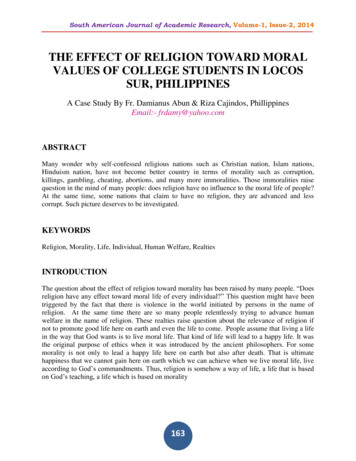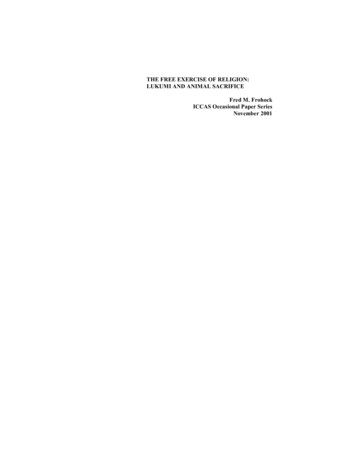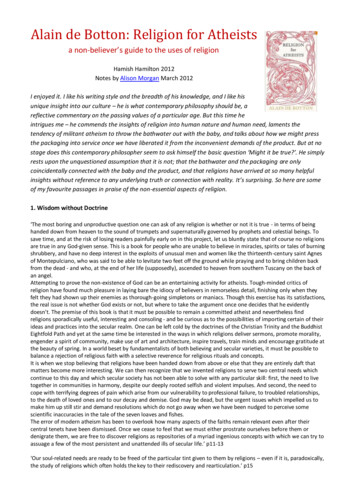
Transcription
South American Journal of Academic Research, Volume-1, Issue-2, 2014THE EFFECT OF RELIGION TOWARD MORALVALUES OF COLLEGE STUDENTS IN LOCOSSUR, PHILIPPINESA Case Study By Fr. Damianus Abun & Riza Cajindos, PhillippinesEmail:- frdamy@yahoo.comABSTRACTMany wonder why self-confessed religious nations such as Christian nation, Islam nations,Hinduism nation, have not become better country in terms of morality such as corruption,killings, gambling, cheating, abortions, and many more immoralities. Those immoralities raisequestion in the mind of many people: does religion have no influence to the moral life of people?At the same time, some nations that claim to have no religion, they are advanced and lesscorrupt. Such picture deserves to be investigated.KEYWORDSReligion, Morality, Life, Individual, Human Welfare, RealtiesINTRODUCTIONThe question about the effect of religion toward morality has been raised by many people. “Doesreligion have any effect toward moral life of every individual?” This question might have beentriggered by the fact that there is violence in the world initiated by persons in the name ofreligion. At the same time there are so many people relentlessly trying to advance humanwelfare in the name of religion. These realties raise question about the relevance of religion ifnot to promote good life here on earth and even the life to come. People assume that living a lifein the way that God wants is to live moral life. That kind of life will lead to a happy life. It wasthe original purpose of ethics when it was introduced by the ancient philosophers. For somemorality is not only to lead a happy life here on earth but also after death. That is ultimatehappiness that we cannot gain here on earth which we can achieve when we live moral life, liveaccording to God‟s commandments. Thus, religion is somehow a way of life, a life that is basedon God‟s teaching, a life which is based on morality163
South American Journal of Academic Research, Volume-1, Issue-2, 2014THE PURPOSE OF THE STUDYThe study wants to find out the role or the effect of religion toward human life, particularly, themoral life of college students in Ilocos Sur. Many students come from different religiouscommunities and most parents are belonged to religious communities. The question here is: doesreligion affect the morality of College students? The results of the study will be used to reassessthe religious practices at home, and school. It can be also used by schools to revisit ethicsinstructions/strategy and religious practices in the schools.THEORETICAL FRAMEWORK, LITERATURE AND STUDIESTHEORIES ON RELIGION AND ITS ROLE IN HUMAN LIFEThe discussion on the effect of religion toward morality cannot proceed without understandingreligion and its role in human life. To understand religion, we look into its etymology. Religionis from Latin word “religionem” (nom. “religio”) meaning: respect for what is sacred, reverencefor the gods, obligation, the bond between man and the gods”. Therefore, from suchetymological meaning, we define religion as a system of belief and practice that accepts a“binding relationship to such a being or beings”. St. Augustine used the word, “ligare” meaning“to bind, to connect”. (http://en.wikipedia.org/wiki/Religion)From its etymological definition, religion is the belief in the existence of gods (the sacred) andits bond with men. Its function is to connect men to gods and men to men. Thus the business ofreligion is to worship gods, God (the sacred) and also to unite/bond people who believe in thesame gods (the sacred). From such understanding we lead to an understanding that religion isactually a binding relationship between men and gods, God (the sacred). Thus, gods, (the sacred)become the centre of a religious community and its unifying factor. In this sense, religion andlife are not in separate ways. In the Eudemian Ethics Aristotle argued that the goal of our livesis service and contemplation of the god. As we contemplate the god, we become like what wecontemplate and so we become most like god by contemplating the god. In his Metaphysics,Aristotle explained that the best human activity is the most god-like namely thinking about thegod and about things that do not change. Aristotle considered god as a magnetic, drawing us byhis attractive power to live the best kind of life possible for us (Hare, 2006).The purpose of religion is to give a new direction to human life style, keeping in mind theimmediate future and contemporary point of view. Religion contains many eternal values asbasis of direction out of which one remained principal (Kumar, 2008). Looking into suchunderstanding, how can we deny the role of religion in human life? We do not believe thathuman welfare was not the motive behind the establishment of religious communities by theirfounders, although their scope might be limited. Religion is committed to general humanwelfare. It was needed not only in the beginning of human beings but today is also needed. Iturges for unity and cooperation to build conducive environment for all human being to stay.164
South American Journal of Academic Research, Volume-1, Issue-2, 2014The idea of religion‟s involvement in human life is further emphasized by Reza’s definition onreligion. Reza (1998) defined religion as all around movement in the light of faith in Allah (God)and a sense of responsibility for the formation of thought and belief, for the promotion of highprinciples of human morality for the establishment of good relations among members of thesociety and the elimination of undue discrimination. This definition provides us a clear role ofreligion in human life particularly human morality.According to Reza, we need religion to provide principles of morality like justice, peace,honesty, righteousness, brotherhood, equality, virtuousness, tolerance, sacrifice, help the poorand others. He argues that these are the virtues without which our lives will lose its order,normalcy and turn into chaos. It is possible to acquire these values without religion but certainlyin the absence of firm religious belief, those values appear to lose their meaning and become amere piece of advice which can be accepted or rejected. These qualities are based on internalfeelings and faith and are naturally beyond ordinary law. We believe that it is God who cultivatesthe values within man and impels him to automatic righteousness and adherence to duty. WillDurant a philosopher, in his book, Pleasures of Philosophy, as cited by Reza says that withoutthe backing of religion, morality is nothing more than arithmomancy, as without it, the sense ofobligation disappears.Supporting the above concepts, different religions have similar teachings about the role ofreligion in human lives. In India, the word “Dharma” is used to mean “religion”. Dharma comesfrom the root “ Dhre” which means “to sustain”. Thus, Dharma is the greatest sustaining force orthe binding force of the society. The goal of Dharma is to create mental and spiritual fellowshipamong all men and to regulate its relation with all living beings. It thus tries to keep the world inperfect equilibrium (Barua, 2008). Hinduism, according to Gandhi, is the most tolerant andliberal religion. It contains ethical and spiritual outlook. Gandhi said that the chief value ofHinduism lies in holding the actual belief that all lives is one, that is all lives coming from oneuniversal source and that is Allah (God).Islam also has personal and social code of behaviour, not only code of behaviour related to theirbehaviour to God but also to human beings. In the Qur‟an there are rules and regulations forvirtues like righteousness, generosity, gratitude, contentment, humility, kindness, courtesy,purity, good speech, respect, wisdom, tolerance, justice, mercy, dignity, courage, firmness,frankness, hope, patience, perseverance, discipline, self-restraint, moderation, prudence, unity,frugality, sincerity, responsibility, loyalty, trustworthiness, honesty, repentance, and spatiality(Da‟wah Group, 2010). One of the five pillars of Islam, such as Zakat encourages Muslims tolook beyond themselves and help the needy through giving alms to the poor particularly duringthe month of Ramadan. (Zahid, 2010)Christianity is not all about God and his relations to human being and how human beings arerelated to Him but it is all about love. God became human being (incarnation) to save humankindfrom their sins because of love. God loves human beings, thus He sent his only son to be ahuman being to save human beings. In return, human beings must love God and his fellowhuman beings too which is summarized into the greatest commandments: Love your God with all165
South American Journal of Academic Research, Volume-1, Issue-2, 2014your mind, heart and soul and love your neighbour as you love yourselves. Such commandmentsare the source of inspirations on how Christians carry their live every day. Thus Christian morallife is based on trying to live and treat others as Jesus did (Jakoblich, 2007)THEORIES ON MORALITY AND RELIGIONMorality is playing important role in regulating human behaviour. It is about what is good andwhat is bad, right and wrong that affect others. However, this does not mean that there is awritten rule or specific codes conduct established by society as it is defined by descriptive theoryof morality but it is more on a universal code of conduct that all rational beings would putforward for governing the behaviour of all moral agents. These codes of conducts are not writtenby society but it is based on natural law as defined by normative theory of morality. Natural lawwould tell us that it is possible for any normal adult in any society to know the general kinds ofactions that morality prohibits, requires, discourages, encourages and allows (StanfordEncyclopaedia of Philosophy, 2010). In this case, all adult rational beings everywhere mustknow what is good and bad, what is right and wrong based on their reason and informedconscience and must conduct themselves according to the command of their conscience. Hauser(2006) said that it is possible that all normal moral and rational agents know the truth, know whatis right and wrong, good and bad.Randall Niles (2007) further explained that this knowledge comes from one‟s own self. There isno need for certain behaviour to be taught. A person makes decision based on his ownknowledge. Lewis as cited by Niles (2007) presents three levels of the importance of morality:first, to ensure fair play and harmony between individuals. Second, to help make us good peoplein order to have a good society, and finally, to keep us in a good relationship with the power thatcreated us. The last concept reminds us that our belief is critical to our moral behaviour. Faith isprerequisite to moral behaviour. Thus, the most significant predictor of a person‟s moralbehaviour may be religious commitment.However, some arguments point out that source of morality is not attached to religion. The ideaof what is good and bad, right and wrong originally are not defined and taken directly fromreligion but it is from natural law. Such concept of good and bad, right and wrong grow togetherwith human life as person grows older. On his On Truth (1624) Edward, Lord Herbert ofCherbury (1582-1648) claimed that all humans have an intuitive grasp of certain basic moraltruths that show us to live.Thus Herbert rejected the subordination of philosophy to theology, holding that religious claimsin conflict with intuitively known moral principles must be false. The idea of Herbert wassupported by the idea of Thomas Hobbes (1599-1679) and John Locke (1632-1704). All agreedthat moral laws of nature were the basic directions for solving the problems posed by ourunsociably social nature (www.Questia.com/Ethics of Psych) In this case; even people withoutreligion are capable of understanding of what is good and bad and live a moral life because it isalready in the human nature. People without religion do not mean they are immoral but they aremoral being too. Montaigne (1533-1592) argued that we must determine for ourselves what good166
South American Journal of Academic Research, Volume-1, Issue-2, 2014life is. We each have a distinctive natural form that tells us what we need and what we cannottolerate. For each person that must be the supreme guide (www.Questia.com/Ethics of Psych).The question why we need morality, Aristotle in his Nicomachean Ethics argued that thepurpose of moral life is happiness. Our morality aims at our happiness. The ancient moralphilosophers thought that their task was to determine what was required for human flourishingwhich is the highest good and to show what virtues were needed in order to attain it. But suchargument has been challenged because it lacks of foundation. If our existence is accidental andlife ends with death, what is the use of living moral life if only to attain happiness? We sacrificeto help other people, we control our self not to harm other people‟s life, and we are invited tolive in love and peace with one another. Is it worthwhile to do all those things? What are ourfundamental motives to be good?However, Mavrodes (1986) as cited by Ramsey (2004) challenged all those who deny therelationship between religion and morality. He said that if there is no fundamental basis formorality, then morality is bound to fail. He continues to emphasize that any attempt to arrive atbasis for morality that is independent from religion is bound to fail. Secular ethics have nofundamental motive to be good. It is too superficial. It lacks of metaphysics and a basis forvalues and obligations. Thus secular ethics cannot answer the question “why be moral all thetime?” If we do not believe in life after death and salvation, then there is no basis for morality.Our belief in life after death and salvation serves as basis for our morality. Religion supports thefeeling of obligation to that which makes sacrifices worthwhile. Religion supports the hope insomething better or richer which is to come and makes being good and sacrificing worthwhile.Secular morality is inadequate method for providing reasons for people to be moral. Consideringthat there is no higher form of judgement and no after life as incentives, and then there is nomuch reason for citizens to be moral.Kaminer (1997) argued that religion is essential to virtue. He claims that it is not surprising tofind faith being touted as the solution to drug abuse, teenage pregnancy and other social ills.Such claims are not baseless. Criminologist Byron Johnson as cited by Wayne Jackson (2010) inhis study, argued that there is a relationship between religion and moral values of individualpersons. The report said that most delinquent crimes are committed by youngsters who have lowlevels of religious commitment. Children who attended church become delinquent with far lessfrequency than those who do not. Myers as cited by Jackson (2010) in his study also pointed outthat most benevolent people of our society are the ones who are involved in religious activity.Those findings convince us that a person who believes in God is a better person or moral person.Morality cannot be maintained without religion. Religion is a necessary factor that can shape themorality of individual persons. Gandhi as cited by Barua (2008) says that religion and moralityare inseparably bound up with each other. To Gandhi, there is no religion higher than truth andrighteousness. Morality is prized by almost all the great religions of the world. Baier (2001) alsomaintains the argument on the relationship between religion and morality. Morality is anexpression of one‟s faith in God. In his book, “If you love me, keep my commandments” heargues faith in God is requirement for morality.167
South American Journal of Academic Research, Volume-1, Issue-2, 2014Even someone like Nietzsche who is credited with giving a major boost to the elimination ofGod from Western culture, never tired of pointing out that Christianity is a whole and one cannotgive up faith in God and keep Christian morality. Nietzsche as quoted by Lewis (1995) said:“ when one gives up the Christian faith, one pulls the right to Christian morality out from underone’s feet. The morality is by no means self-evident. Christianity is a system, a whole view ofthings thought out together. By breaking one main concept out of it, the faith in God, onebreaks the whole. It stands or fall with faith in God”.Such statement indicates that Nietzsche recognize the relationship between religion or faith andmorality that both cannot be separated. Morality stands or falls with faith in God. Lewis (1995)further strengthened the argument that morality begins with the character of God.Bertrand Russel (1957) acknowledged the influence of religion toward morality; however itsinfluence is not only good but also bad aspect. However such bad influence is caused by thewrong teaching. He accused the clergymen as the cause of such problem. Thomas Dixon (2008)further pointed out that many today argue that religious beliefs are necessary to provide moralguidance and standards of virtuous conduct in an otherwise corrupt, materialistic, and degenerateworld. In the same vein Christian Theologian Ron Rhodes (2010) has remarked that “it isimpossible to distinguish evil from good unless one has infinite point which is absolutely good.In supporting such argument,Kelley, et.al (2008) conducted a study on the interactive effects of religion and deterrence onpatterns of drinking among college students. As indicators of different aspects of religion, theyinclude religiosity, a belief in biblical literalness and a belief in drinking is sin. The study foundthat there is an interactive effect for religion with deterrence efforts drinking in campus.Along the same interest, Desmond, Purpura, Elizabeth and Sarah (2010) studied on the effect ofreligion toward morality. They concluded that although religiosity is a strong predictor of moralbeliefs, however, the study found out that the correlation is not perfect. In other words,individuals may frequently attend church, and report that religion is an important part of theirlives, without adopting all of the moral standards that are promoted by religious groups.Study on religion and tolerance for crime was conducted by Corcoran, Pettinicchio, Robbins,(2009). They found that individuals who are members of religious communities and those whoattend church more often are more likely to be intolerant of crime and the magnitude of theseeffects are larger in non-modern countries. Thus they use tolerance of crime as a potentialmechanism explaining variation in violent crime across a large sample of countries.The effect of religion toward tolerance of same sex marriage was also examined by PowellWilliams, et.al, (2007). They examined both direct and indirect effects of religiosity andtolerance of same sex marriage. The study found that beliefs regarding morality and family aresignificant intervening factors influencing the effects of religion and tolerance of same sexmarriages.168
South American Journal of Academic Research, Volume-1, Issue-2, 2014In line with such comparison, another comparative study on moral values between Theists andAtheists were made by Deem (2005). He surveyed 1,600 Canadian and asked them what theirbeliefs about God were and what moral values they considered to be very important. The resultof the study showed that Theists got higher moral values than the Atheists in all indicators.However, it does not also mean that Atheists have no moral values. Morality exists to a certaindegree even without religion. This opinion is supported by the study of Hauser (2006). The studypointed out that when it comes to unfamiliar moral dilemmas, atheists and those with religiousbackground show no difference in their moral judgments. It suggested that our intuitive judgmentof right and wrong operate independently from our religious beliefs but religion strengthens andimprove our moral life.ARGUMENTS AGAINST THE RELATIONSHIP BETWEEN RELIGIONAND MORALITYRealities may challenge those arguments supporting the relationship between religion andmorality. Many people who claim to be religious and yet, in reality they are far from godliness asone can be. Marc Hauser and Peter Singer, (2005) argued that religion is separable frommorality. They claim that there is no connection between religion and morality. There aremillions of people who participate in no religion who live moral lives. This indicates that it ispossible to live a moral life without participating in any religion. Thus religion is not absolutelynecessary to live moral life. Harris (2006) argued that there is no evidence to support that thereis a relationship between religion and morality. If religion were necessary for morality, thereshould be some evidences that atheists are less moral than believers. He concluded that there isno difference in moral thinking and moral behaviours of religious and non-religious people.Further he said that religious societies are not more moral than those that are more secular intheir cast.The argument of Hauser and Singer might have been influenced by the argument of positiveatheism argument as represented by Cohen. Cohen (1868-1954) argued that there is norelationship between religion and morality. We quote his statement:“Are we to believe that if we had never received revelations from God or even if there were nobelief in God, a mother would have never learned to love her child, men and women would neverhave love each other, men would never have placed any value upon honesty, truthfulness orloyalty? After all we have seen an animal mother caring for its young, even to the extent ofrisking its life for it. We have seen animals defend each other from common enemy and jointogether in running down prey for a common meal.The argument of Cohen is related to the previous argument of Leibniz as promoted by ChristianWolff (1679-1754). Christian Wolff argued that we are obligated to do what will make us andour condition, or that of others, more perfect and this is the law of nature that would be bindingon us even if God did not exist. He further pointed out that even Confucius already knew byreason all that mattered about morality, even though he did not know anything about Christ.169
South American Journal of Academic Research, Volume-1, Issue-2, 2014Such argument is followed by Baron d‟Holbach 91723-1789) argued that morality did not needreligion especially Christianity.Indeed religion is not always associated with morality. Philosopher, David Hume stated that “thegreatest crimes have been found, in many instances, to be compatible with a superstitious pietyand devotion; hence it is justly regarded as unsafe to draw any inference in favour of a man‟smorals, from the fervour or strictness of his religious exercise, even though he believe themsincerely” (Hitchen, 2007) Farrell Till (1994) further argued that we have not proven theexistence of God. If we have not proven the existence of God, how we can talk about morality?Morality is possible without God, without religion. He argued that gentiles where St. Paul wassent, has discovered morality on their own even before they know God and before they know theBible.Michael Wang (1997) conducted a study on the relationship between religious beliefs and ethicalbehaviour. The study concluded that religious beliefs have no correlation with ethical behaviour.The ethical behaviour of people who say “religion is essential” to their life is often nodistinguishable ratings from the behaviour of those who describe religion as unimportant factorin their life. Such finding seems to confirm the idea of Atheist, George H. Smith as cited by Till(1994) in his book, “Atheism: The Case against God” that religion is not connected to morality.Hauser (2005) argued that if religion were necessary for morality, there should be some evidencethat Atheists are less moral than the believers. According to him, some more secularized societymay be less violent.Amid such controversy, in the Philippine contexts, we are challenged to find out really in reallife, if there is a relationship or no relationship between religion and morality. Thus, we have togo down to the reality of life and ask people how religion affects their moral life or no affect atall.The summarized aforementioned ideas and studies served as initial ideas from which theresearcher derived insights to conduct this study.STATEMENT OF THE PROBLEMSThe study was aimed to determine the effect of religion toward moral values of college studentsin Ilocos Sur, Philippines. Specifically the study answers the following questions:1. What is the level of religious awareness and practices of college students in Ilocos Sur?2. What is the level of moral values of college students in Ilocos Sur?3. Is there any significant relationship between religion and morality?4. Is there any significant relationship between religious awareness and morality?5. To what extent does religious awareness affect the morality?6. To what extent does religion affect the moral values of college students in Ilocos Sur?HYPOTHESESBased on the statement of the problems, the study is guided by the following hypothesis:170
South American Journal of Academic Research, Volume-1, Issue-2, 20141. There is no significant relationship between religion and morality.2. There is no significant difference between religions and morality.3. There is no significant relationship between religious awareness and morality4. There is no effect of religious awareness toward morality.SCOPE AND DELIMITATION OF THE STUDYThe study was conducted to fourth year college students in Ilocos Sur particularly in Vigan Cityand Vigan- Bantay who are currently enrolling in education course. Two schools were locatedinside Vigan City and two schools were located at Bantay, a town that is close or attached toVigan City. It will be limited to measure the effect of religious awareness toward their morallives and to what extent religious awareness affect morality.METHOD OF RESEARCHRESEARCH DESIGNThe research utilized the descriptive method of research. This method is considered appropriatebecause it seek to determine the religious beliefs and practices of students and their moral valuesand how far religion affects the morality of students.RESEARCH INSTRUMENTSTwo sets of questionnaires were used to gather the data, the questionnaires on religious beliefand practices and the moral values of the students. The questionnaire is consisted of three parts:Part I: solicited the data of demographic profiles of students such as school, gender and religionwhere they belong. Part II was made of questions to identify the extent of religious awarenessand practices of students. Part III was made of questions to identify the level of the moral valuesof college students in Ilocos Sur.Scale12.34.5.Descriptive InterpretationsStrongly DisagreeSomewhat disagreeDisagreeAgreeStrongly agreeTo answer questionnaires along moral values of the students, the following scale was used:Scale123Descriptive InterpretationsNot very relevantSomewhat relevantRelevant171
South American Journal of Academic Research, Volume-1, Issue-2, 201445Very relevantExtremely very relevantTo interpret the average score on each dimension on the religious belief and practices of collegestudents, the following norms were used:Range of 0Descriptive InterpretationsStrongly Disagree.somewhat disagreeDisagreeAgreeStrongly AgreeTo interpret the average score on each dimension on the moral values of students, the followingnorms were used:Range of 0Descriptive InterpretationsNot very relevantslightly relevantSomewhat RelevantVery relevantVery relevantPOPULATIONThe population of the study were composed of fourth year college students who are taking upcollege education in Vigan City and Vigan Bantay Ilocos Sur and only those who are taking upelementary and secondary education course. To determine the sample size, the Slovin‟s formulawas used where:n (1 Ne2)Where:n sample sizeN Population sizee desired margin error (percent allowance for non-precision because of the use of the sampleinstead of the population).Data Gathering ProceduresIn the pursuit of the objective of the study, the researcher asked the permission of the Presidentsof different colleges in Vigan City and Vigan Bantay. After given the permission, the researcher172
South American Journal of Academic Research, Volume-1, Issue-2, 2014then distributed questionnaires to different colleges/university and retrieved those questionnairesafter the students filled them up.STATISTICAL TREATMENT OF DATATo enable the researcher present and summarize the data in accordance with the objectives set inthis study, the following statistical treatment were used:1. The weighted mean was used to determine the level of religious awareness and practices andmoral values of the students.2. The One-way of Analysis of F-test (ANOVA) was used to determine the differences on theeffect of religion on morality between religions.3. The Pearson‟s r was used to determine the correlation between religion and morality, religiousawareness and morality.4. Multiple regression analysis was used the effect and the magnitude of the effect of religionand religious awareness toward morality.RESULTS/ FINDINGSPROBLEM 1: WHAT IS THE LEVEL OF RELIGIOUS AWARENESS ANDPRACTICES OF COLLEGE STUDENTS IN ILOCOS SUR?This question was to measures the level of their religious awareness as indicated by their meanratings. As indicated by their mean ratings, the findings show that all students are high alongtheir level of religious awareness and practice. Thus, we can conclude that all students in IlocosSur are religious.PROBLEM 2: WHAT IS THE LEVEL OF MORAL VALUES OF COLLEGEST
Durant a philosopher, in his book, Pleasures of Philosophy, as cited by Reza says that without the backing of religion, morality is nothing more than arithmomancy, as without it, the sense of obligation disappears. Supporting the above concepts, different religions have sim










